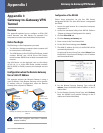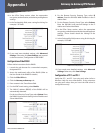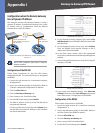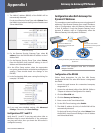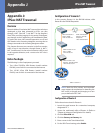
80
Deployment in an Existing Network
4-Port SSL/IPSec VPN Router
Appendix H
Appendix H:
Deployment in an Existing
Network
Overview
If you have a current VPN router in your network, you can
add the 4-Port SSL/IPSec VPN Router (model number:
RVL200), so that the SSL clients can access the existing
network resources.
The two configuration examples are for LAN<=>WAN and
LAN<=>LAN, between a 4-Port SSL/IPSec VPN Router and
an existing VPN Router, such as the Linksys 10/100 16-, 8-,
or 4-Port VPN Router (model numbers: RV016, RV082, or
RV042).
LAN<=>WAN
The Routers are on different networks (192.168.1.x and
192.168.2.x).
LAN<=>LAN
The Routers are on the same network (192.168.1x).
LAN-to-LAN Connection
192.168.1.100-110
192.168.1.50-54
LAN
LAN
LAN
WAN2
WAN1
RVL200
Device Under Test (DUT)
LAN IP: 192.168.1.2
DHCP Server: Disabled
RV082 (Assistant Test Device)
LAN IP: 192.168.1.1
DMZ Host: 192.168.1.2
Port Forwarding: HTTPS
[TCP 443] -> 192.168.1.2
RVL200 LAN to RV082 LAN
To connect the RVL200 LAN to the RV082 LAN:
Physically connect a numbered port (Ethernet 1-4) on
the RVL200 to a LAN port on the RV082.
Access the web-based utility of the RVL200. (Refer to
“Chapter 4: Advanced Configuration” for details.)
Click the DHCP tab.
•
•
1.
2.
3.
Remove the checkmark from the Enable DHCP Server
setting.
Click Save Settings.
Click the Setup tab.
Click the Advanced Routing tab.
In the Static Routing section, enter 0.0.0.0 in the
Destination IP field.
Enter 0.0.0.0 in the Subnet Mask field.
Enter 192.168.1.1 in the Default Gateway field.
Enter 1 in the Hop Count field.
Select LAN from the Interface drop-down menu.
Click Add to list.
Access the web-based utility of the RV082.
Click the Setup tab.
Click the DMZ Host tab. Configure the RVL200 as the
DMZ Host for the RV082. Enter 192.168.1.2, the IP
address of the RVL200.
Click the Forwarding tab.
Select HTTPS[TCP/443~443] from the Service drop-
down menu.
Enter the IP address of the RVL200, 192.168.1.2.
Enable the entry.
Click Add to list.
After an SSL VPN client establishes its connection, the
client can access the existing computers (192.168.1.100-
110) or the servers (192.168.1.50-54) on the RV082 LAN
side.
4.
5.
6.
7.
8.
9.
10.
11.
12.
13.
14.
15.
16.
17.
18.
19.
20.
21.













